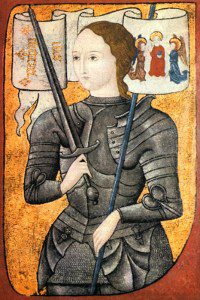|
 In this time of geo-political unrest, we have powerful lessons to learn from events of the Middle Ages. In North America alone, there are more than 90 academic programs and institutes devoted to interdisciplinary Medieval Studies. In this time of geo-political unrest, we have powerful lessons to learn from events of the Middle Ages. In North America alone, there are more than 90 academic programs and institutes devoted to interdisciplinary Medieval Studies.
Now, more than ever, we need to understand the past in order to sustain our future. It is an ill-conceived perception that the Middle Ages-500 to 1500 A.D.-were the "dark ages" filled with barbarity, ignorance, disease, and violence. On the contrary, many of the cultural and social institutions that are central to the founding ideals of our United States took shape during that period.
Consider the Magna Carta, drafted in 1215, as the seed of constitutional law as we know it today. Recall the sweeping educational initiatives of Alfred the Great of England and Charlemagne of France, who collected and copied some of the most important texts then in existence-works on philosophy, religion, history, medicine, literature, science, mathematics, and architecture. These documents laid the foundation for many successive "medieval Renaissances," such as the flowering of the twelfth century. Culturally, the late period included the rise of the university system of education and an explosion of artistic expression and architectural innovation, particularly in the construction of cathedrals and castles. It is in this period as well that we see the rise of urban life and the development of a middle class.
Radical innovations in ship construction and way-finding devices made long distance travel increasingly easy, thus establishing trade routes that still exist today. The Middle Ages also marked the first sustained contact between the Western world and the Middle East. The Crusades-along with happier, more mutually beneficial cultural and economic interactions between the West and East-inform our nation's relations with the Muslim world even now. As a field, Medieval Studies is truly interdisciplinary and international, encompassing more than a dozen languages and countries and including disciplines that range from medieval archaeology to paleoclimatology and other emerging disciplines.
We have more to learn about medieval culture as we build bridges of understanding to the present. More research by qualified scholars is needed so that important aspects of the Middle Ages may be presented to students in clear and engaging fashion. The Bonnie Wheeler Fellowship will provide funding for medieval scholars to do just that. With your support, the work of Medieval Studies scholars will help bring fresh life to this critical period in Western history and keep it alive for generations of students to come.
|